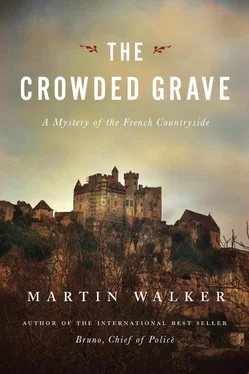Martin Walker - The Crowded Grave
Здесь есть возможность читать онлайн «Martin Walker - The Crowded Grave» весь текст электронной книги совершенно бесплатно (целиком полную версию без сокращений). В некоторых случаях можно слушать аудио, скачать через торрент в формате fb2 и присутствует краткое содержание. Жанр: Полицейский детектив, на английском языке. Описание произведения, (предисловие) а так же отзывы посетителей доступны на портале библиотеки ЛибКат.
- Название:The Crowded Grave
- Автор:
- Жанр:
- Год:неизвестен
- ISBN:нет данных
- Рейтинг книги:5 / 5. Голосов: 1
-
Избранное:Добавить в избранное
- Отзывы:
-
Ваша оценка:
- 100
- 1
- 2
- 3
- 4
- 5
The Crowded Grave: краткое содержание, описание и аннотация
Предлагаем к чтению аннотацию, описание, краткое содержание или предисловие (зависит от того, что написал сам автор книги «The Crowded Grave»). Если вы не нашли необходимую информацию о книге — напишите в комментариях, мы постараемся отыскать её.
The Crowded Grave — читать онлайн бесплатно полную книгу (весь текст) целиком
Ниже представлен текст книги, разбитый по страницам. Система сохранения места последней прочитанной страницы, позволяет с удобством читать онлайн бесплатно книгу «The Crowded Grave», без необходимости каждый раз заново искать на чём Вы остановились. Поставьте закладку, и сможете в любой момент перейти на страницу, на которой закончили чтение.
Интервал:
Закладка:
“You’re a dangerous driver,” she said. “I’d started crossing that road and it was my right of way. You have no right to drive like that in town.” Florence turned to Bruno and Jules. “Take my name. I’ll be happy to be a witness.”
The woman in the car glanced at the children as if seeing them for the first time. She swallowed hard, looked at Florence and then back at the children. She gripped the steering wheel, braced her shoulders against the car seat and lowered her head.
“I’m sorry,” said the magistrate, raising her head to look directly at Florence. “And I’m sorry if I frightened your children. I didn’t mean to, and I apologize. I was in too much of a hurry.” She reached into the bag on the seat beside her, pulled a driving permit from her purse and handed it through the window to Jules. Then she leaned across to open the glove compartment and took out a plastic folder with insurance documents and the carte grise, the car registration. She also handed Jules a laminated ID card with the red, white and blue stripes of the Republique Francaise across her photograph.
“You were right, Monsieur Courreges. I’m a magistrate. The law should take its course. Please take this woman’s statement and then I will give mine. I freely admit that I was driving too fast and should have stopped for the pedestrian crossing.”
Florence looked down at her. “When did you start this job?”
“Monday. First job out of magistrates’ school.”
“Well, in that case…” Florence paused. “Just be careful in the future.” She unlocked the carriage and wheeled her children off toward Fauquet’s cafe promising them ice cream.
“I think I lost my witness,” said Bruno. “But the parking fine stays.”
“And the speeding ticket,” said Jules. “But I’ll put it in the fifty zone. That won’t be too bad.” He filled out the ticket and handed it to her. “I’ll see you, Bruno.” He got into his van, reversed quickly and drove out of the parking lot.
“Shall we start again?” Bruno said. “I’m Bruno, not Monsieur Courreges, and we’re supposed to be colleagues. May I call you Annette?”
“Yes, please do, and I’m sorry about this.” She tried a hesitant smile. It made her look even younger. Fair-haired and slim, with a thin face that looked pretty now that she was not trying to be fierce, she could have been a teenager. The suit seemed incongruous, as if she were dressing for a role as someone older, a businesswoman perhaps.
“I understand,” said Bruno. “I was very nervous when I started and probably tried too hard to make an impression. But I don’t think I was foolish enough to try doing it with a car.”
“That woman with the children, is she a friend of yours?”
“Yes, but then most people in this town have known me for years and I try to get along with everybody.”
“It’s just… you have this reputation, Monsieur-I mean, Bruno.”
He raised his eyebrows. He could imagine what young magistrates might think of him, an ex-soldier who hunted and drank and who tried never to arrest anyone and cared little for the subtleties of modern law enforcement with its counseling and political correctness.
“Let’s go and have a coffee, and you might want to pay for that ice cream Florence promised the kids,” he said. “She’s a good woman, a teacher and single mother, and worth getting to know. I presume you haven’t many friends yet in the area.”
She swung her legs out of the car. The skirt of the suit was tight and rather short, and her legs were shapely. He handed her back the car keys and she made to lock the door. Bruno coughed.
“Perhaps you could fit the car into a single space, Annette,” he said.
She grinned, got back into the car, reversed and straightened it. “Anything else, before that ice cream?”
“I hope you have some spare clothes in the car. That suit won’t look so good after we get to the site.”
“I brought walking shoes, as you advised. And I’ve got a snowman in the back of the car,” she said, referring to the white plastic coveralls that were worn by forensics teams. “What more does a girl need?”
“This,” he said, handing her the parking ticket.
Now that the skeleton had been taken away, the grave site had reverted to being an archaeological dig. Bruno noticed that the winch had been placed over the large pit. He told Annette to be careful to follow his footsteps between the trenches and led the way to the place that was still marked off with crime scene tape. Teddy and two other students were digging just beyond it, extending their ditch and still looking for the midden. Bruno leaned over the yellow tape and looked into the empty grave.
“There’s nothing to see,” said Annette, sounding irritated.
“The forensics people have been doing their job,” Bruno said.
“They even took some of the soil, probably wanting to see if the body bled in place,” said Teddy. “They sieved it first, which was decent of them, but found nothing.”
“Not even a bullet?”
“I heard them talking,” said one of the other students; he spoke good French, but with a strong accent. “They said it was still in the skull.”
“And you are, monsieur?”
“Kasimir, from Poland, University of Krakow.” He had dark hair, clear blue eyes and wore a T-shirt featuring some Polish artist Bruno had never heard of. Kasimir leaned against the side of the ditch, pulled a pack of tobacco from his pocket and began to roll a cigarette. “They put a black cloth over the grave and sprayed something. Then they shone a light down and said they were sure he’d been killed right here.”
“Kasimir, did you hear anything else that might help the magistrate here?” Bruno recognized the standard forensic test for blood, although he’d be surprised if traces had lasted so long.
“They said they thought they might get a rough date of death from the shoes he was wearing. They were sneakers, or at least they had been.” He shrugged. “Other than that, the skeleton looked intact, what we could see. They put screens up.”
“People must be upset,” said Annette. “Would you like me to arrange for some counseling?”
“Counseling?” asked Kasimir, snorting. “We’re here to find bodies. Skeletons are what we do.”
“Something else I wanted to ask,” Bruno said, turning to Teddy. “Where were you in the early hours of this morning, around dawn?”
Teddy looked startled. “In bed, fast asleep, back at the campsite.”
“And Kajte? That girl I saw you with.”
“She was with me.” There was a touch of bravado in the statement. “She was there when I woke up. We all had breakfast together. Kas was there. You remember this morning?”
“I’m not good in the mornings, but we were all there today, drinking the worst coffee in the world,” Kasimir said, lighting his cigarette. “Why do you ask?”
“Some animal rights militants tried to liberate a farm full of ducks. Some of the ducks were killed when they wandered onto the road, which seems a funny way of protecting animals.”
“Maybe no worse than the alternative,” said Teddy. “But you’re all into foie gras around here.”
“Not all of us,” said Annette, suddenly animated. She turned to Bruno. “What happened?”
“A nearby farm had its fences torn apart, and PETA leaflets were stuck on the bits that were left. It stands for ‘People for the Ethical Treatment of Animals,’ ” Bruno said. “The farmer has kids to raise, and he barely makes a living as it is, without losing a few ducks and geese and having to repair fences. And around here, we believe in the ethical treatment of farmers.”
Teddy said nothing, but Kasimir looked at him curiously.
“You ever tried foie gras?” Bruno asked, his tone conversational rather than challenging.
Читать дальшеИнтервал:
Закладка:
Похожие книги на «The Crowded Grave»
Представляем Вашему вниманию похожие книги на «The Crowded Grave» списком для выбора. Мы отобрали схожую по названию и смыслу литературу в надежде предоставить читателям больше вариантов отыскать новые, интересные, ещё непрочитанные произведения.
Обсуждение, отзывы о книге «The Crowded Grave» и просто собственные мнения читателей. Оставьте ваши комментарии, напишите, что Вы думаете о произведении, его смысле или главных героях. Укажите что конкретно понравилось, а что нет, и почему Вы так считаете.












